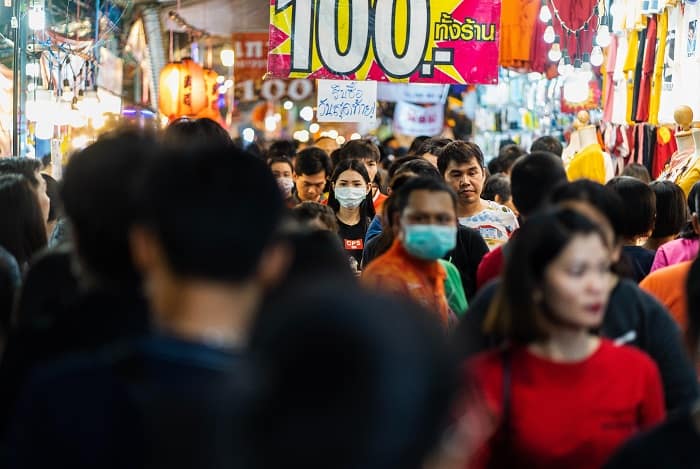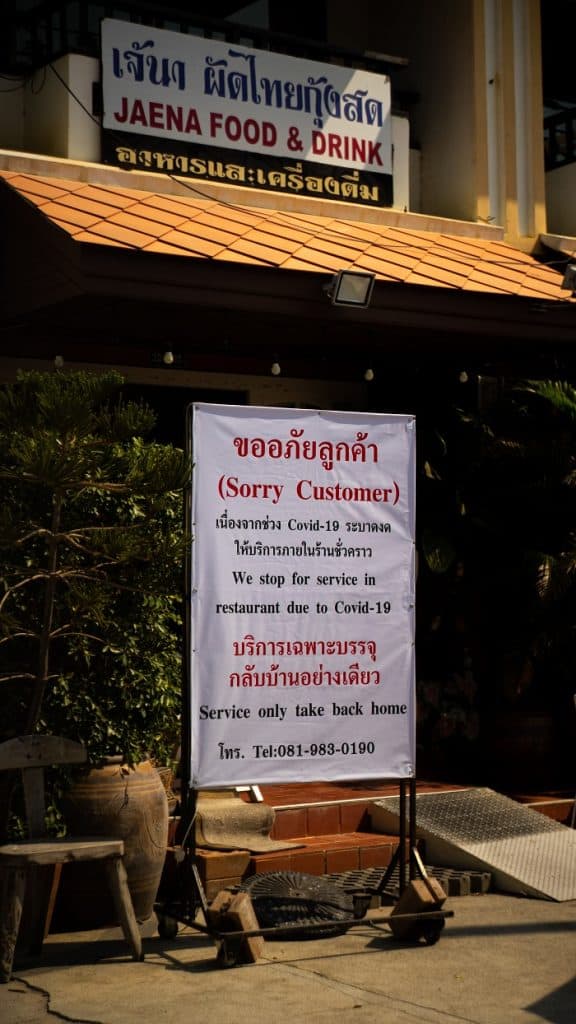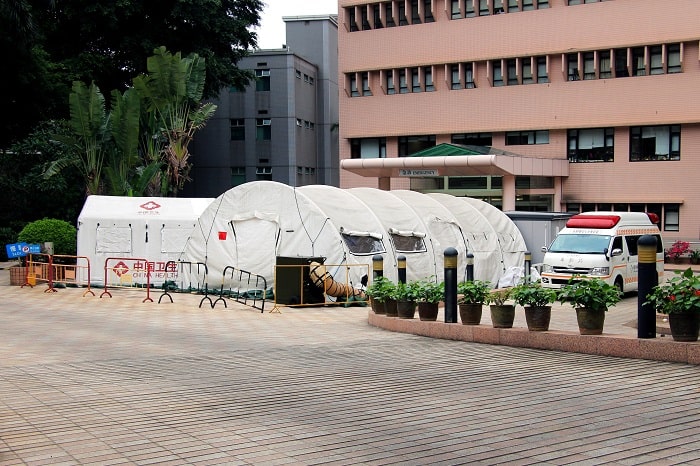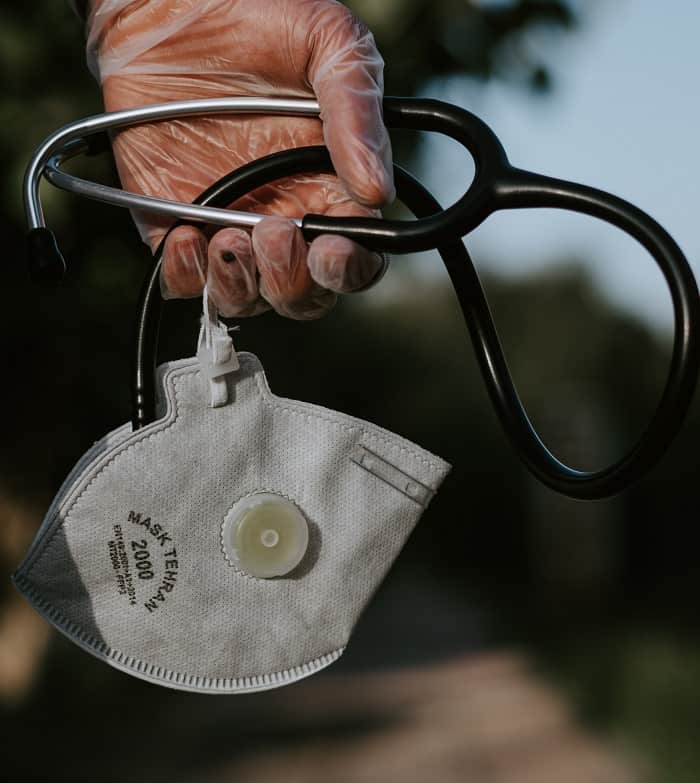Coronavirus Management, Masks, Protective Gear
Coronavirus: Thailand’s Preventative Measures
The first coronavirus infection in Thailand was reported on 13 January 2020. Thailand was the first (but definitely not the last) country outside of China to report a coronavirus infection.
As of April 22, 2020, Thailand has reported 2,826 cases of coronavirus, 49 deaths, and 2,352 recoveries. The numbers are high, but Thailand’s efforts have stabilized the documented cases of coronavirus in the country.

A study from the University of Southampton reported that Thailand was a high-risk country for coronavirus.
Thailand was hit with the coronavirus outbreak during a time when its economy was slowing down. The Thai government announced a partial lock-in to help manage the spread of coronavirus. Thailand has set guidelines to balance non-fiscal and fiscal matters with the health and well being of the Thai people in mind.
How is Thailand Handling the Coronavirus?
Thailand confirmed it’s first death due to complications of the coronavirus on 01 March. The country faced it’s most rapid jump in cases on 19 March. There was an influx of cases reported from the Lumpini Boxing Stadium and other major venues in Bangkok. Religious ceremonies also yielded high reports of coronavirus.
Other cases were reported from people who traveled through Japan and parts of China.
On 4 February, Thailand evacuated 138 citizens from Wuhan, China. The evacuees arrived in Thailand on AirAsia. All of the evacuees were checked and sanitised upon arrival. Six of the evacuees were immediately transferred to local hospitals to be treated for symptoms related to the coronavirus. All evacuees were quarantined for a 14 day period after arrival.
On 23 January, Thailand raised a level 3 travel advisory. The government advisory warned citizens to avoid non-essential travel to China. On 26 March, Thailand was placed under a state of emergency that is meant to extend until 30 April. Some regions of Thailand have been placed under complete lock-down. All foreign citizens have been banned from entering Thailand. Health surveillance systems and temperature scanners have been placed at 38 airports by the Department of Disease Control (DDC).
Hospitals have inforced screening measures to manage the process of admitting patients suffering from symptoms of the coronavirus. Health professionals are on high alert and required to report any cases of coronavirus within the community.
Thailand’s preventative measures also include border control. The Thai government denied entry of the MS Westerdam Cruise Ship. This was a precautionary method on the part of the government to protect the citizens.
Thailand has canceled several national events due to coronavirus. The MotoGP race was originally scheduled in March but has been postponed due to health concerns.
All Thai New Year celebrations (Songkran) were canceled to protect the citizens of Thailand.
The government has also ordered the closing of all schools, colleges, and large gatherings for a duration of two weeks or until the pandemic has curved. These measures are similar to those put in place by Korea and many other countries.
Non-essential businesses such as entertainment venues, sports venues, and movie theatres have also been shut down in an effort to contain the spread of coronavirus.
The island of Phuket was placed under a mandated lockdown beginning 30 March. All small island airports were also shut down. The mandated airport shut down sparked a movement of migrant workers from Laos, Myanmar, and Cambodia.
How Are Hospitals Dealing With Coronavirus in Thailand
Doctors and medical professionals at the Rajavithi Hospital in Bangkok have experimented and succeeded in using a cocktail of HIV drugs and antiviral medication to treat cases of the coronavirus. All hospital staff wear face masks and personal protective gear like nitrile gloves to protect themselves from the coronavirus.
Cases of coronavirus have been treated at the Sirikit Naval Hospital and other hospitals in Thailand. Hospitals are testing suspected cases and working to create awareness throughout the country.
Thailand’s embassy stated that the country is Asia’s most prepared land in the event of an epidemic.
Thailand’s healthcare system was ranked second out of 165 countries capable of treating their sick citizens and healthcare workers, and third in the prevention of spreading the virus.
The Ministry of Public Health launched a major cleaning effort early in February to spread awareness of personal hygiene practices in workplaces, public places, and homes. Hotels and establishments have been briefed to monitor the health of their guests.
What Can We Learn From Thailand’s Coronavirus Efforts?
Early on, Thailand set its efforts to enforce social distancing rules and educate their people on the importance of good hygiene during the coronavirus outbreak.
Despite the social and economic challenges faced by Thailand, the country continues to move forward with groundbreaking medical practices and cooperation from the Thai people.
Thailand’s import-export business took a big hit in the pandemic. China is the largest exporter of goods in Thailand. The pandemic has had a negative impact on trade with an estimated loss of $65m.
Considering Thailand’s weakening economy, the country has managed to stay afloat and maintain a united front throughout the pandemic.
No country truly knows how to handle the coronavirus pandemic. Thailand, like other countries, is doing its best to thrive through a hard time. If you’re in need of masks, see Medisupply Warehouse’s range today.



